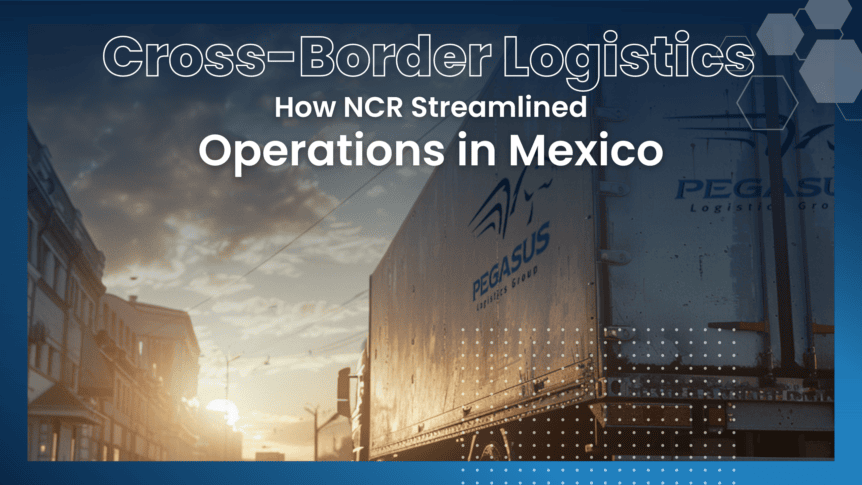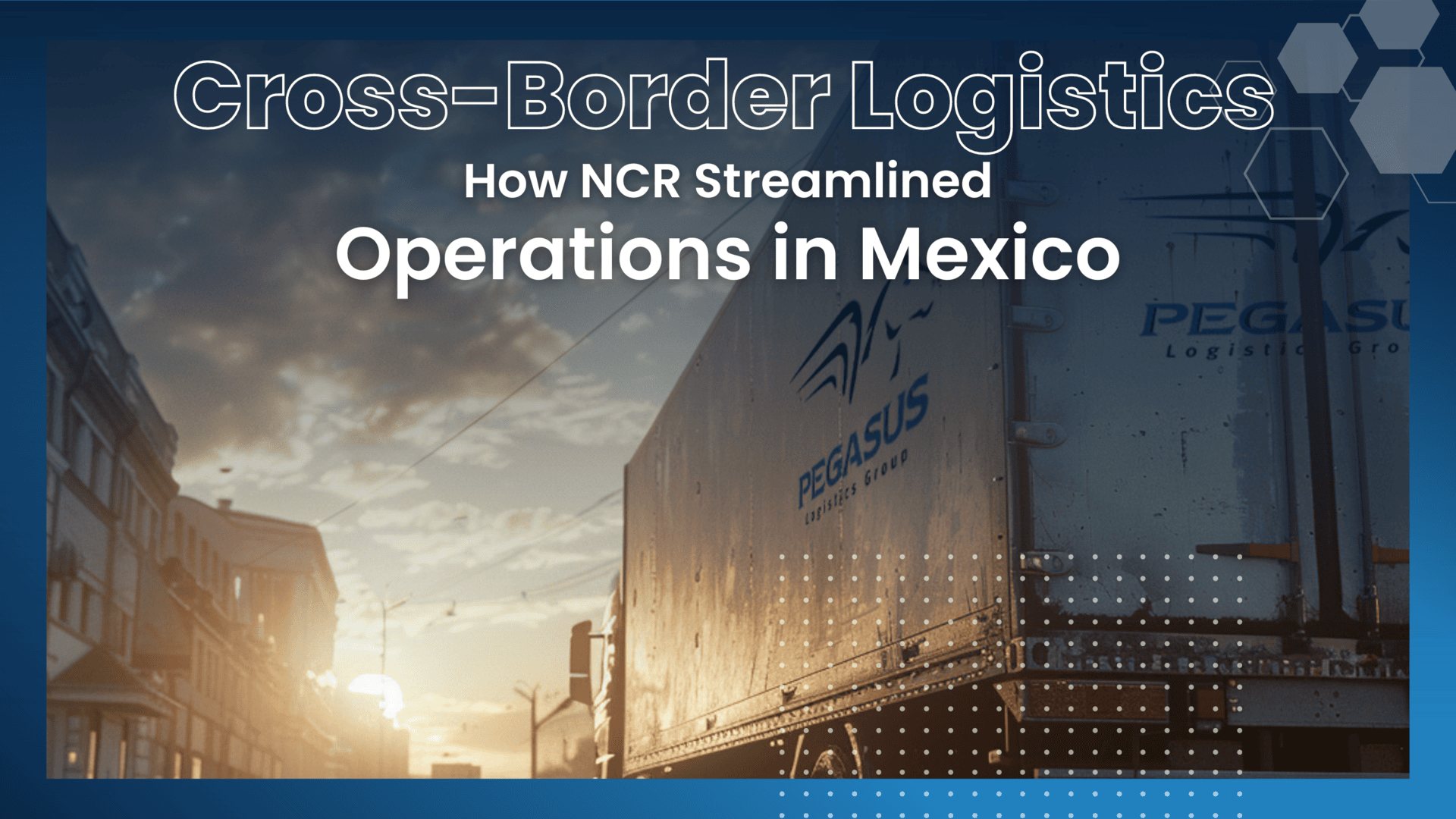When NCR Atleos decided to expand its operations with a new manufacturing site in Guadalajara, Mexico, it needed more than just a logistics provider—it needed a partner who could understand its challenges and ensure its high standards of service and communication were upheld.
We stepped up to meet these needs, addressing specific pain points such as maintaining consistent capacity and streamlining border communication. Through our partnership, we ensured a smooth transition for NCR’s logistics operations and provided them with valuable insights on managing and scaling cross-border logistics effectively. This collaboration shows how challenges can be transformed into opportunities for growth and success with the right logistics partner.
Table of Contents
Key Takeaways
- Capacity Management: Ensuring consistent capacity was vital to maintaining NCR’s supply chain efficiency.
- Strong Communication: Effective communication across borders minimized delays and facilitated smooth operations.
- Local Expertise: Leveraging our knowledge of Mexico’s policies and border processes helped us anticipate and resolve potential issues.
- Long-Term Partnership: Successful collaboration built a foundation for ongoing growth and future opportunities with NCR.
“They wanted consistency in the capacity, which was a challenge. They also needed to be really close to their brokerage process because this involved the free trade zone in Laredo, which is different from what they managed in El Paso before.” — Arturo Olvera, Managing Director of Mexico at Pegasus Logistics Group
Cross-Border Logistics with NCR
Adapting swiftly to changes when handling cross-border logistics, especially with a complex supply chain network like NCR’s, is essential. NCR was already a client, but its needs evolved when its team altered its logistics setup in Mexico. Their manufacturing site shifted to Guadalajara, prompting a new logistics solution that involved a change in location and a re-evaluation of their entire process.
Adapting to these changes required more than a logistical shift—we needed to ensure the new solution aligned with NCR’s operational needs. Their team’s consistent contact within the US remained the same, but there was an increased demand for support from the Mexican side. This involved deeper engagement in border communication and operational aspects. We aimed to provide a comprehensive solution, starting with smaller volumes, to build trust and prove the new system’s efficiency.
Building Trust and Scaling Operations
The main objective in these early stages was to gain NCR’s trust by demonstrating the capabilities of the logistics team in Mexico. Key to this was maintaining a high level of service and clear communication channels. Success wasn’t measured only by the initial setup but by the ability to grow the volume of shipments and add new lanes over time. The team’s efforts were rewarded as they met these objectives, laying the groundwork for ongoing collaboration and further opportunities.
Establishing a robust and reliable logistics framework sets the stage for future growth. With each successful shipment and clear communication, NCR’s trust in the operation increased. This trust allowed for exploring new lanes and expanded services, demonstrating the importance of meeting and exceeding client expectations. The lessons learned from this initial phase highlighted the value of adaptability and responsiveness in cross-border logistics.
“For us, it was really making sure that our team was well-trained and versed on what needed to happen on the US side, but also making sure that the origin side was covered, with the main pain points being coverage and border communication.” — Arturo Olvera, Managing Director of Mexico at Pegasus Logistics Group
Addressing Specific Pain Points in Cross-Border Logistics
When embarking on a cross-border logistics project, it’s critical to identify and address specific pain points early on. For NCR, a key concern was ensuring consistency in capacity. This consistency is vital, as it directly impacts the reliability of the supply chain. Inconsistent capacity can lead to delays, stock shortages, and, ultimately, dissatisfaction among end customers.
Another significant pain point for NCR was the need for a seamless connection with their brokerage, mainly because the operation involved the free trade zone in Laredo. This was a shift from their previous operations in El Paso, which meant adapting to new processes and regulations. Close communication between all parties involved—logistics providers, brokers, and the client’s internal team—was essential to avoid delays and ensure smooth transitions through the border.
Enhancing Communication to Prevent Delays
To manage these challenges effectively, robust communication strategies must be in place. Since the logistics provider was not handling the brokerage, transparent and timely communication with the broker was crucial. This ensured freight moved quickly through customs and reached the free trade zone without unnecessary hold-ups. Strong communication channels help preempt issues, allowing teams to address potential problems before they escalate.
For NCR, capacity was not just a preference but a necessity. Ensuring that the required capacity was available meant that operations could run smoothly, avoiding bottlenecks when demand outstrips supply. This highlights a broader lesson in cross-border logistics: it’s not just about moving goods from point A to point B but about aligning with the client’s expectations and operational realities.
“The biggest thing was understanding the border process. The problem with not having that bilingual knowledge, but also the border knowledge, kind of made the process tougher.” — Arturo Olvera, Managing Director of Mexico at Pegasus Logistics Group
The Role of Bilingual Communication
Effective communication is the backbone of any successful logistics operation, and in cross-border scenarios, this is even more crucial. For NCR, having a bilingual contact was a significant priority. The ability to communicate fluently in both English and Spanish ensured that all parties involved could understand each other clearly, reducing the risk of misunderstandings that could disrupt operations.
Beyond language, having a deep understanding of border processes was essential. The complexities of cross-border logistics extend far beyond simple translation needs. They involve navigating intricate regulations, customs procedures, and security requirements on both sides of the border. For the US team, fully grasping the challenges and nuances of the Mexican side—such as timing restrictions, security concerns, and specific documentation requirements—was critical.
Leveraging Local Knowledge for Better Outcomes
Teams familiar with the local environment bring invaluable insights that can streamline logistics operations. In Mexico, understanding the common issues faced at the border, from the best times to cross to security protocols, made a substantial difference. This local expertise enabled the logistics team to anticipate problems and implement solutions proactively. It’s not just about speaking the language; it’s about being fluent in the logistics landscape of the region.
We could address NCR’s needs by involving bilingual and locally knowledgeable staff. This approach facilitated smoother operations and helped build trust with the client. Clients must feel confident that their logistics partner understands all process aspects, from language to local laws and beyond. Trust is built when clients see that their logistics provider is well-versed in handling their specific needs, ensuring that their goods move efficiently and safely across borders.
“The solution for the customer was more about setting up the internal process to be consistent with what they’re already receiving in the States. It was just making sure that we followed the steps, had the bilingual connection, and met expectations beyond just the shipment.” — Arturo Olvera, Managing Director of Mexico at Pegasus Logistics Group
Navigating Internal Challenges
While addressing the external logistics needs of a client, it’s crucial to recognize internal challenges that can arise. For NCR, one of the most significant challenges wasn’t with the logistics itself but with aligning the internal processes of Pegasus Mexico to match those of the US. Consistency in processes across different regions is critical to ensuring smooth operations, as it minimizes the risk of errors and delays.
NCR had established processes and billing procedures already in place in the US. Our Mexico team needed to learn and implement these processes to maintain consistency and meet NCR’s expectations. This alignment ensured that NCR experienced the same level of service quality, no matter which side of the border they were dealing with. Consistency is vital for maintaining client trust and ensuring a seamless service experience.
Overcoming Internal Process Hurdles
Implementing new internal processes can be challenging. It requires training, adapting to new working methods, and, often, a cultural shift within the team. For Pegasus Mexico, the challenge was learning new procedures and integrating them in a way that aligned with NCR’s high standards. Ensuring that all documentation, billing, and communication matched what was done in the US helped prevent discrepancies that could lead to client dissatisfaction or operational inefficiencies.
One critical aspect often overlooked is that logistics goes beyond just transporting goods; it includes everything from billing to collections and documentation. Ensuring that these backend processes were high quality for NCR was just as important as the physical movement of goods. By focusing on these areas, logistics providers can offer a complete service package that addresses every aspect of the client’s needs.
Creating a framework that supports seamless integration and training is beneficial. This could include standardized onboarding for new processes, continuous training sessions, and regular audits to ensure compliance with client expectations. By investing in internal process improvements, logistics providers enhance service quality and build a more robust, resilient operation capable of adapting to client needs and market changes.

Understanding Service Level Agreements (SLAs)
Service Level Agreements (SLAs) are essential in logistics to clearly define the expectations between a service provider and the client. For NCR’s cross-border operations, having well-defined SLAs was crucial to ensure that both parties were on the same page about the level of service required. SLAs help set performance benchmarks, including delivery times, communication protocols, and response times for handling issues.
In NCR’s case, the US processes remained unchanged, as they were already well-established and effective. However, the Mexican side of the operation required more attention. The focus was on training and equipping the team to handle specific requirements unique to the Mexican logistics environment. By understanding and addressing these unique needs, the logistics team could maintain the same service quality across all operations.
Focus on Coverage and Border Communication
Coverage and border communication were two critical elements that stood out in NCR’s SLAs. Coverage refers to the availability of resources—trucks, personnel, and facilities—to meet the client’s needs at any time. In cross-border logistics, ensuring adequate coverage is vital to prevent disruptions and maintain the flow of goods.
On the other hand, Border communication deals with the processes involved in moving goods across international boundaries. Effective communication at the border can prevent delays, reduce the risk of goods being held up, and ensure compliance with all regulatory requirements. For NCR, ensuring these two elements were managed effectively was vital to meeting their operational needs.
Aligning Team Training with Client Expectations
Training the logistics team to align with the client’s SLAs is essential. This involves understanding the SLAs and knowing how to implement them in real-world scenarios. For NCR, this meant ensuring that the team in Mexico was fully trained on the requirements specific to the Mexican side of the operation. This training focused on the logistical aspects of moving goods and the communication skills needed to handle interactions with customs, brokers, and other stakeholders.
Another critical aspect of SLAs is understanding the consequences of failure. Clients like NCR expect logistics providers to deliver on promises and have contingency plans for when things go wrong. Whether it’s a delay at the border, a shortage in capacity, or a communication breakdown, having a clear plan to address these issues is crucial. By preparing for potential failures, logistics providers can minimize their impact, maintain client trust, and ensure operations continue smoothly.
“Feedback has been very positive; customers are very happy. We actually got an email today where they’re saying we are over-communicating a bit much, which I see as a good thing. In general terms, it’s getting impact on new lanes and new businesses.” — Arturo Olvera, Managing Director of Mexico at Pegasus Logistics Group
Positive Feedback: A Marker of Success
Receiving positive feedback from clients is one of the most telling indicators of success in logistics. For NCR, the feedback was overwhelmingly positive, which is a testament to the logistics team’s practical strategies and hard work. Positive feedback not only helps build a stronger relationship with the client but also boosts the team’s morale, encouraging them to continue delivering high-quality service.
Interestingly, one piece of feedback from NCR was that the team was “over-communicating.” While this might seem excessive initially, it can be a positive sign. More communication is often better than less in logistics, especially in cross-border operations. Over-communication ensures that all parties are fully informed, which reduces the chances of misunderstandings or errors. It also shows the client that the logistics provider is proactive, engaged, and dedicated to updating them at every process step.
Expanding Opportunities Through Reliable Service
Consistently positive feedback and successful operations have led to tangible results for NCR. The logistics team’s ability to maintain a high level of service and effective communication has opened up new lanes and opportunities for business growth. This demonstrates the power of reliable service: clients are more likely to trust the provider with additional business when they see that their logistics needs are being met consistently and effectively.
Logistics providers must continue focusing on client satisfaction to maintain and expand these opportunities. This means meeting the baseline requirements and going above and beyond to understand and anticipate client needs. Building long-term relationships with clients like NCR involves regular check-ins, being open to feedback, and continuously seeking ways to improve service delivery.
Whether positive or negative, feedback should always be seen as a valuable tool for improvement. In the case of NCR, the positive feedback reinforced the effectiveness of the current strategies. Still, it also highlighted areas where the team could refine their approach, such as finding the right balance in communication. By listening to client feedback and making adjustments as needed, logistics providers can continuously enhance their service offerings and ensure they remain aligned with client expectations.
Lessons for the Future
The experience with NCR offers several lessons for logistics providers. First, always value and encourage client feedback, as it provides insights into what is working and where improvements can be made.
Second, don’t underestimate the importance of communication—keeping clients informed builds trust and transparency. Finally, each successful client relationship should be a foundation to explore new opportunities, demonstrating that consistent, high-quality service is the key to business growth.
Ready to Optimize Your Cross-Border Logistics?
If your company is facing the challenges of cross-border logistics or looking to optimize its supply chain for international operations, Pegasus Logistics Group is here to help. Our team has the expertise and local knowledge to create custom solutions tailored to your needs, ensuring seamless operations and efficient communication.
Contact us today to learn how we can partner with you to achieve your logistics goals and drive your business forward.
About Pegasus Logistics Group
We provide custom logistics solutions and outstanding experiences by investing resources into team members, technology, and a superior transportation network. Taking the necessary steps to find the perfect match for your warehouse operations will ensure that they will perform optimally while also providing protection and helping your business reach its goals.
We have strategically positioned capacity available for your ever-changing supply chain. Our operational model has strict performance benchmarks, and we are focused on delivering your company the best value, efficient results, and the most reliable service.


